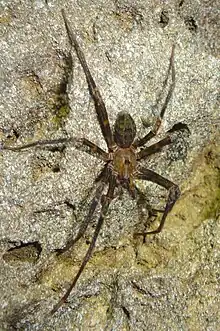Spelungula
Spelungula is a monotypic genus of South Pacific large-clawed spiders containing the single species, Spelungula cavernicola, or the Nelson cave spider. It was first described by Ray Forster, Norman I. Platnick, & Michael R. Gray in 1987,[2] and has only been found in caves in the northwestern part of New Zealand's South Island.[1][3]
| Spelungula | |
|---|---|
 | |
| Nelson cave spider, Oparara basin, Karamea, New Zealand | |
| Scientific classification | |
| Domain: | Eukaryota |
| Kingdom: | Animalia |
| Phylum: | Arthropoda |
| Subphylum: | Chelicerata |
| Class: | Arachnida |
| Order: | Araneae |
| Infraorder: | Araneomorphae |
| Family: | Gradungulidae |
| Genus: | Spelungula Forster, 1987[1] |
| Species: | S. cavernicola |
| Binomial name | |
| Spelungula cavernicola Forster, 1987 | |
Etymology
The genus name is derived from "spelunca", which is latin for cave and is feminine in gender. The species name "cavernicola" refers to the species restriction to caves.[2]
Description
It is New Zealand's largest known spider, with a legspan of 13 to 15 centimetres (5.1 to 5.9 in) and a body length of 2.4 centimetres (0.94 in), and its main prey is cave weta.[4][5]
Conservation status
It is one of the few spider species afforded legal protection under the New Zealand Wildlife Act.[6][7] It is classed as "Range Restricted" and stable in the New Zealand Threat Classification System.[8]
In May 2022, the Crazy Paving Cave in Kahurangi National Park, where the spiders are known to breed, was closed for a year in an attempt to help the population to recover.[9]
See also
References
- Gloor, Daniel; Nentwig, Wolfgang; Blick, Theo; Kropf, Christian (2019). "Gen. Spelungula Forster, 1987". World Spider Catalog Version 20.0. Natural History Museum Bern. doi:10.24436/2. Retrieved 2019-06-07.
- Forster, R. R.; Platnick, N. I.; Gray, M. R. (1987). "A review of the spider superfamilies Hypochiloidea and Austrochiloidea (Araneae, Araneomorphae)". Bulletin of the American Museum of Natural History. 185: 1–116.
- Sirvid, P. J.; Vink, C. J.; Wakelin, M. D.; Fitzgerald, B. M.; Hitchmough, R. A.; Stringer, I. A.N. (2012). "The conservation status of New Zealand Araneae". New Zealand Entomologist. 35 (2): 85–90. doi:10.1080/00779962.2012.686310. ISSN 0077-9962. S2CID 84574921.
- McLachlan, Andrew. "Nelson cave spider". www.teara.govt.nz. New Zealand Ministry for Culture and Heritage Te Manatu. Retrieved 2016-05-29.
- "Topic: Nelson cave spider | Collections Online – Museum of New Zealand Te Papa Tongarewa". collections.tepapa.govt.nz. Retrieved 2016-05-28.
- Faulls, D. (1991). "Eight legs, two fangs and an attitude". New Zealand Geographic (10): 68–96.
- Wildlife Act – Schedule 7 Terrestrial and freshwater invertebrates declared to be animals
- Molloy, Janice; et al. (2002). "Classifying species according to threat of extinction. A system for New Zealand" (PDF). Department of Conservation (New Zealand). Retrieved 2008-02-29.
- "Nelson cave to shut for a year to improve rare spider's population". RNZ. 1 June 2022. Retrieved 1 June 2022.
